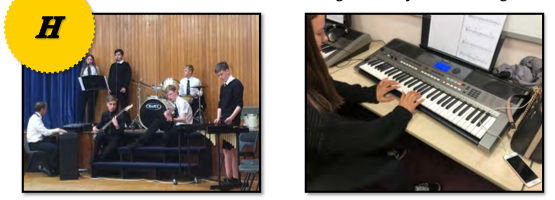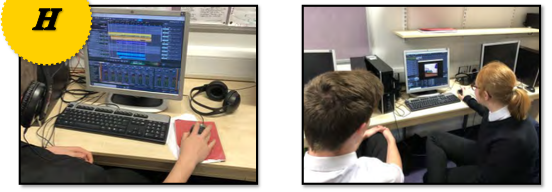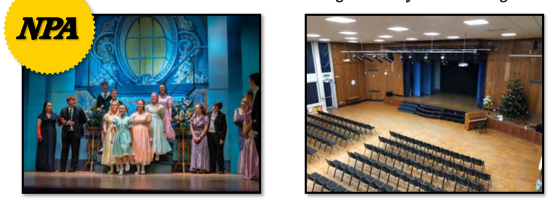Music
What will I learn?
You will develop practical skills on two instruments and/or voice, performing a varied programme totalling 12 minutes over both disciplines. This needs to be at an equivalent standard of ABRSM Grade 4.
You will gain experience in composing, through the completion of a short piece of music (1 – 3 mins.) using ICT. A review, based on constant reflection on the process, is also required.
Through a variety of listening experiences, including live performances, you will gain an understanding of musical concepts and how to identify these.
How will I learn?
Through a variety of solo and group activities, you will experience playing and performing music from different genres and will evaluate your own performances and the performances of others.
You will combine practical skills and ICT to create and develop musical compositions.
By listening to a wide range of music, you will gain an understanding of musical concepts and literacy.
How will I be assessed?
Practical Performance
Instrument 1(or Voice) (25%) Assessed by Visiting external examiner from February 2021.
Instrument 2 (25%) Assessed by Visiting external examiner from February 2021.
Composing (15%) Composition along with review, submitted to SQA April 2021
Understanding Music (35%) A written paper, completed in May 2021 as part of the main exam diet is also externally marked.
Career Opportunities
Performing musician, live events production, music journalist, songwriter, club, theatre and arena management, tour manager, music producer, radio and television, musical theatre, accompanist, cruise ship musician, sound designer, video game music designer, music teacher, instrumental instructor, armed forces musician, orchestral / choral conductor, music therapist.

Music Technology
What will I learn?
You will develop skills in the analysis of music in the context of 20th and 21st century musical styles and genres e.g Jazz, Rock, Pop and EDM, with more detailed knowledge required.
You will develop skills in the use of music technology hardware and software to capture and manipulate audio.
You will use music technology creatively in sound production in a range of contexts. This can include radio broadcast, composing and/or sound design for film, audiobooks and computer gaming.
You will learn to create a multi-track, or electronically produce music.
How will I learn?
You will learn through a range of teacher demonstration and practical activities, including group and individual work.
You will get the opportunity to experiment with several different types of music and instrumentation when applying microphone techniques.
You will be able to experiment with audio capture of other sound sources to create sound effects.
You will take part in listening activities to gain an understanding of music from the 20th – 21st century, and the development of music technology during this time.
You will develop the ability to use hardware and software to manipulate audio from a range of sound sources.
How will I be assessed?
I will be assessed through one piece of coursework which is submitted in March. This can include creating a live performance, radio broadcast, composing and/ or sound design for film, audiobooks and computer gaming. It must include multi-tracked recording(s) of sounds and/or music, and multi-tracked, electronically produced sounds
A final written listening exam will take part in May
Career Opportunities
Sound engineer, radio and television production, film and game sound design, recording studio management, radio broadcast engineer, music producer, media specialist, audio and lighting technician, recording artist, multimedia specialist.

Level 6 Musical Theatre (NPA)
What will I learn?
Pupils will study 3 of the following units:
- Acting through Song (1 Credit Value)*
- Solo singing performance (1 Credit Value) **
- Group singing performance (1 Credit Value) **
- Group dance performance (1 Credit Value)
- Preparation for audition (1 Credit Value) **
- (* Mandatory unit **Suggested pathway units)They will look at basic singing, vocal and movement skills in preparing for a performance of musical theatre.
How will I learn?
Pupils are assessed in school in their solo and group performances where we assess use of voice and movement and portrayal of character. There is a portfolio to document their process and research which is also used for marking purposes. A key part of this process is how pupils reflect on their own work.
How will I be assessed?
I will be assessed through one piece of coursework which is submitted in March. This can include creating a live performance, radio broadcast, composing and/ or sound design for film, audiobooks and computer gaming. It must include multi-tracked recording(s) of sounds and/or music, and multi-tracked, electronically produced sounds
A final written listening exam will take part in May
Career Opportunities
Pupils can choose to opt Higher Drama or Music. Successful completion of performing arts courses at Annan has seen pupils accepted to various university and college courses. Pupils have attended The Royal Conservatoire of Scotland, Queen Margaret’s Edinburgh and Cumbria University to study Musical Theatre, Acting, Stage Technologies. Many pupils who have studied Higher Drama have gone on to work professionally in Theatre.
Musical theatre is useful for careers in performing arts industry, Law, Education/Childcare, Marketing/Advertising, Public Relations/Human Resources among many others.


